Here’s a look back to the beer judging at the Tesco Drinks Awards in 2006, as published in the November 2006 issue of BEER. It was my second proper feature commission, and my first time as a beer judge. I’m eternally grateful to the awards organiser Richard Morrice for getting me started on what’s become a regular activity for me, not only in the UK but abroad.
As mentioned in the article, I was teamed up with Pete Brown, the first time we’d met and the first time he’d been asked to judge beer too. Today I would probably advise against putting two inexperienced judges together but we coped. Like many new judges we were over-conscientious in spending too much time on each beer, and ended up alone at our table long after everyone else had gone to lunch.
There have been many changes in the decade since, and I’ve noted a few of them in square brackets in the text. Most significantly, the competition itself is no more — I believed it survived only another year after this piece. I find it perplexing that the major supermarket chains seemed more excited about speciality beer 10 years ago when far fewer people were buying it than they are today when it’s an established growth market.
Pete meanwhile followed up the success of Man Walks Into a Pub with several other books to become the closest thing in beer writing to a crossover artiste. I’ve since requoted Richard’s comment on the generosity of the industry many times, and it remains essentially true.
It’s 10 o’clock on a rainy Friday morning in the City of London and I’m among a gathering of brewers, beer writers, cider wonks and sundry industry figures facing the daunting prospect of tasting 205 beers and ciders before lunchtime. The occasion is the preliminary judging of the 2007 Tesco Drinks Awards, and all the beers are new to the UK bottled market, which means many British ones are new recipes.
I’m assigned to tackle 22 autumn and winter beers from small brewers, with three bottles of each entrant lined up anonymously, numbered like prizes at a WI tombola stall. I’m joined by Pete Brown, cheerful author of Man Walks into a Pub, though we’re asked to score individually rather than confer, giving marks for appearance, aroma, palate, aftertaste and overall appeal.
Pete and I are both newbies at this and, several litres of mineral water and a packet of water biscuits later, we’re the last table to finish. Pete is a fan of hoppy pale beers while I tend towards the dark side, but I’m reassured to see our judgements broadly align. Nearly all our beers have reached a good basic standard, but only a few really stand out.
Based on our scores, between five and eight beers in each category go forward to a 15-strong final panel a fortnight later. The winners earn an engraved tankard – and more importantly an 18-week guaranteed listing at Britain’s biggest supermarket chain, with the assistance of Tesco marketing experts to help name the beer and design the packaging.
This year the tankards went to Loddon and Hook Norton for spring/summer beers; Williams Brothers and Hall & Woodhouse/Badger for autumn/winter beers; Coopers of Adelaide, Australia in the import category with their vintage ale; Coors for innovation with a new method of making low alcohol lager; and a cider from Whin Hill.
Now in its 11th year, the contest, the only one regularly supported by a major retailer, can boast the widest consumer recognition other than CAMRA’s Champion Beer of Britain. “About this time of year, stores start asking us when the new winners are coming in,” says Tesco beer wines and spirits director Dan Jago, “because their customers have been asking them.”
In fact, CAMRA provided the original inspiration when, back in 1996, Tesco asked independent marketing consultant Richard Morrice, formerly of Courage, to think of a good way to raise awareness of its speciality ale list, back then one of the most interesting on the UK high street.
Inspired by the CBoB model, Richard worked with CAMRA and the British Guild of Beer Writers to devise what was then called the Tesco Beer Challenge. The first contest in 1997 attracted over 100 entries, from which ScotCo’s McEwan’s No 1 Champion Ale emerged victorious [the brand is now owned by Heineken].
The next year there were both spring and autumn winners, and in 1999 awards for both small (under 10,000 barrels/16,700hl per year) and large brewers. An import category debuted in 2005, followed by innovation and cider this year, spurring a rebrand to “Drinks Awards” to reflect the enhanced scope. The concept has even crossed the supermarket aisles, with a Cheese Challenge launched in 2003.
While Tesco’s everyday beer list is not quite the standout it once was, the grocery giant remains committed to the Awards. It’s a way of raising authority and credibility for what bottled ale buyer Ian Targett calls a “hero area”, appealing to the more sophisticated consumer who also spends on other high-end items.
Everyone agrees that the Awards have spurred innovation in the industry: Dan Jago, who spends a good deal of time at much bigger and better established international wine contests, tells me he rarely encounters so much enthusiasm among wine makers for new ideas as British brewers now display.
For the brewers, the Awards can provide a step change in access to market. Four-time winner Hall & Woodhouse, a sizeable regional once best known for rather staid cask ale, has become a major supplier of exotic bottled specialities since elderflower-flavoured Badger Golden Champion scooped top honours in 1998. Four Badger beers are now among the top 10 best selling ales at Tesco.
“The Beer Challenge was massively important to us”, says Badger marketing manager Rick Payne. “It took us from 2 per cent to 10 per cent of the bottled ale market. We’ve targeted a different kind of consumer, more willing to experiment with unusual flavours, but the product development benefits our on-trade too.”
Success is not always guaranteed, however. Scottish micro Harviestoun, now owned by Caledonian [now once again independent, while Caledonian is part of Heinkenen], has since dropped two of its three previous winners and the third is no longer sold in Tesco. “But it was still well worth doing,” says the brewery’s Ryan Main. “It prompted us to innovate, and it broke us into the bottled beer sector, where we’ve had most success with other brands like Schiehallion and Bitter and Twisted.”
2001 winner Wickwar’s Mr Perrett’s Traditional Stout didn’t even complete its original listing period. “I don’t think we worked together well enough on the marketing,” says brewery founder Ray Penny, “and the beer didn’t get the in-store promotion it needed.”
“Tesco could do more to guide customers to winning beers,” Ray continues, “but I think they’re nervous of robbing Peter to pay Paul. Having said that, we’ve all learnt from the experience, and we’re doing well with another brand in Tesco, Cotswold Way. I’d certainly consider it worthwhile to enter again when the opportunity arises.”
Real Ale in a Bottle accounts for under a third of previous winners. Both brewers and retailers agree that consumer education is still needed here – and the consistency of quality to nurture consumer confidence. “We eliminated six bottled conditioned beers from this year’s competition simply because they were off,” says Ian Targett. “But if we get these issues sorted out I think RAIB could be a sleeping giant. The CAMRA badge scheme is a great help here and I’m proud we’re showing it on one of the 2006 winners, Young’s Ruby Star” {Young’s is no longer brewing].
Richard Morrice agrees that getting the marketing right for winning beers is the key to capitalising on success. But in the meantime there’s the winning itself to enjoy. “I know it’s an obvious thing to say, but the thing I still like best is when the winners are announced to a wave of genuinely warm applause,” he says. “It’s a very generous industry.”


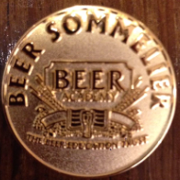
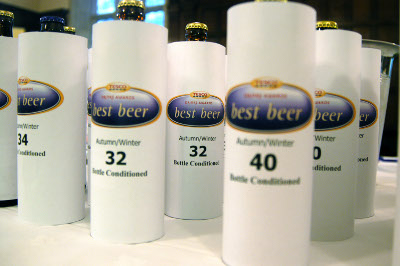
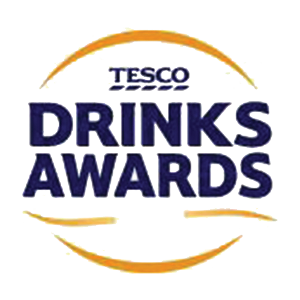
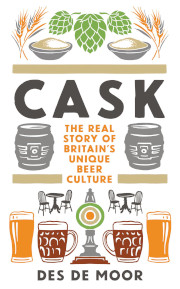
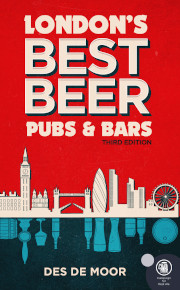
Leave a Reply